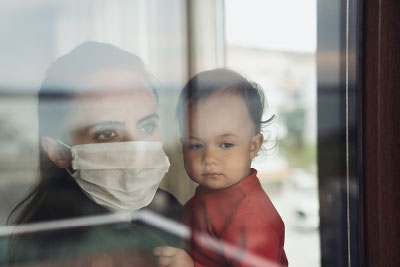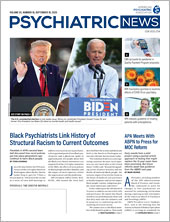Pregnant women and new mothers are increasingly seeking psychiatric services for mental health concerns related to the COVID-19 virus, according to maternal mental health experts.
“The volume of referrals to our Mother-Infant Psychiatry Program has appeared to fluctuate with the COVID-19 infection rates in our community,” said Alison Hermann, M.D., a psychiatrist at Weill Cornell Medicine and co-author of a recent JAMA Psychiatry article about supporting maternal mental health in the context of COVID-19. “There has been a palpable level of distress amongst pregnant and postpartum women throughout this pandemic.”
This trend of increased worry among perinatal women is understandable. Data from the Centers for Disease Control and Prevention published in June indicate pregnant women who contract COVID-19 are 50% more likely to need intensive care and 70% more likely to require ventilation care than nonpregnant women.
Leena Mittal, M.D., director of the Division of Women’s Mental Health in the Department of Psychiatry at Brigham and Women’s Hospital and associate medical director of MCPAP for Moms (Massachusetts Psychiatric Access Program for Moms, a statewide perinatal mental health resource in Massachusetts), also noted a clear uptick in COVID-related mood and anxiety symptoms among perinatal patients over the past several months.
“We hear from all different angles the ways in which perinatal woman are impacted,” she said. “A lot of it is what you might expect—increases in distress and worry, which has been impactful in adding to the already higher risk of mental health complications during pregnancy and the postpartum period. But there have also been some unanticipated risks.”
For instance, said Mittal, many women report experiencing trauma related to changes in the birth experience, like being separated from one’s partner during delivery or being unable to have friends or family at home providing support for their newborn.
“Women are very concerned about COVID-19 exposure for themselves, their babies, and their adult family supports, such as grandparents. This often leads to strict isolating behaviors, which can further worsen psychiatric symptoms,” added Hermann. “Worries about COVID-19 exposure, as well as the psychological effects of infection control practices, can lead to poor adherence to necessary medical care; rushed changes to birth plans; rejection of effective coping skills, such as behavioral activation practices; and missed opportunities for essential education and support.”
Many women also may experience a type of grief reaction over the loss of what their idea of what labor would be like or what being a new parent would be like, which, in most cases, has profoundly changed due to COVID-19 and its countermeasures.
Another impact of COVID-19 that could place children at risk is an increase in substance use disorders during the pandemic, noted Mittal. “There have been more overdoses seen broadly and also the ongoing concurrence of substance use, especially while caring for children, resulting in increased levels of concern for being reported to Social Services,” she said.
In response to these concerns, Mittal and Hermann encouraged psychiatrists to think not only about how to treat pregnant and postpartum women experiencing mental health problems during this time, but how to be proactive and identify strategies that could prevent new or worsening symptoms.
“Women with psychiatric histories or subsyndromal symptoms should participate in preventive psychotherapy. For the most part, women who have been stabilized on an effective medication regimen [during pregnancy or postpartum] should remain on that regimen, with few notable exceptions. They include valproate, which is contraindicated due to risk of congenital malformations,” said Hermann. “All perinatal women who are in psychiatric treatment should have a strategy for effective symptom monitoring and a plan for responding to symptoms that might arise.”
But due to COVID-19 infection control measures, such as limited in-person health care visits and shorter hospital stays, there are now fewer opportunities to screen perinatal and postnatal women for psychiatric symptoms. Thus, said Dr. Hermann, it is vital that psychiatrists know their local referral resources and have a way of referring patients quickly. There also should be a plan for contacting postpartum women for symptom screening and support soon after discharge.
Traditional interventions for anxiety, depression, trauma, and addiction can continue to be offered, but psychiatrists might have to think outside the box in terms of service delivery, said Mittal. Telehealth has been the most common workaround. But not all patients want to use or have access to telehealth technology, and psychiatrists should be mindful of this and plan accordingly.
Mittal also pointed out that medication prescribing may need to be restructured, such as extending the duration of prescriptions (when safe to do so), creating mail order prescriptions instead of having women go into the pharmacy, and—especially for substance use disorders—considering not making all prescriptions contingent on toxicological testing.
Unfortunately, any changes that psychiatrists make to perinatal screening, assessment, diagnosis, and treatment probably need to be feasible for the long term and not just as temporary solutions.
“We are all kind of stuck right now, as this has gone on for so long,” Mittal said. “[Psychiatrists] have to figure out how to provide care for patients in this situation as our ‘new normal’ instead of looking at this as how to provide care during a crisis response.” ■
“Meeting Maternal Mental Health Needs During the COVID-19 Pandemic” is posted
here.
The CDC report, “Characteristics of Women of Reproductive Age with Laboratory-Confirmed SARS-CoV-2 Infection by Pregnancy Status—United States, January 22–June 7, 2020” is posted
here.
More information on MCPAP for Moms can be found
here.

